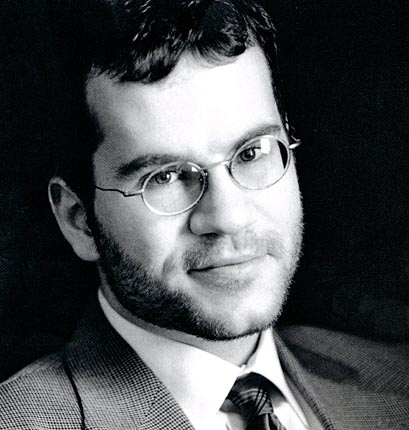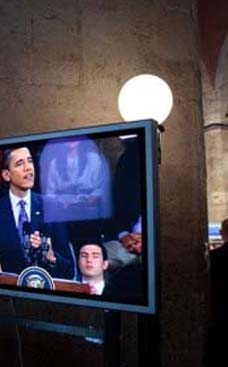
"I knew Dave Wallace well enough to have responded to the news of his suicide, in September 2008, with overwhelming grief, though I did not know him nearly well enough to have had any knowledge of his decades of depression. In my shock I sought refuge in the only oasis I could find: his work. While I knew no answers would be found there, I hoped that rereading Wallace would provide some vague, analgesic insight into his (then) unfathomable decision. Many others were doing the same, and a number of commentators pointed to a passage in Wallace’s Kenyon College commencement speech, where he discusses “the old cliché about the mind being ‘an excellent servant but a terrible master.’ ” Wallace goes on to say: “It is not the least bit coincidental that adults who commit suicide with firearms almost always shoot themselves in: the head. They shoot the terrible master.”" Author Tom Bissell served as a Peace Corps Volunteer in Uzbekistan.
Tom Bissell writes: The terrible master eventually defeated David Foster Wallace
Great and Terrible Truths
Suzy Allman for The New York Times
By TOM BISSELL
Published: April 24, 2009
In the autumn of 2005, an e-mail message with the unpromising subject header “Thought you’d like this!!!” landed in my in-box. The sender, a family friend, was an incurable forwarder of two-year-old John Kerry jokes, alerts for nonexistent computer viruses and poetry about strangers who turn out to be Jesus. This latest offering contained not the expected link to a YouTube video of yawning kittens but several dozen paragraphs of unsigned, chaotically formatted text. It bore this title: “Transcription of the 2005 Kenyon Commencement Address — May 21, 2005.” Before I had reached the end of the first paragraph I believed I could identify the author. A quick search verified it: The commencement speaker for Kenyon College’s graduating class of 2005 was, indeed, David Foster Wallace.
The novelist Richard Ford spoke at my college graduation; 13 years later, I can recall precisely nothing of what he said. Which does not mean it was bad. The commencement address — not quite an essay, more intimate than a speech — is a highly particular literary form. It is also a uniquely disposable one. Imagine you have written the greatest commencement address in history. What do you do with it, once it has been delivered? The answer: nothing. I wrote a rather nice one a few years ago for the graduating class of my hometown community college. Would anyone like to read it? I suspected as much. When the graduation caps are thrown into the air, the commencement address’s only obvious utility is jettisoned along with them.
Wallace’s address managed to avoid this fate not because it was great (though it was). The address was saved, thanks to the enterprising soul who transcribed it from video and posted it on the Internet, where, somehow, it came to the attention of my family friend — who would not have known David Foster Wallace if he fell on her. Thanks to the enthusiasm of people like her, and the magic of the cut-and-paste function, the address became a small sensation and must now rank high among the most widely read things Wallace ever wrote.
Wallace was often accused, even by his admirers, of having a weakness for what Nabokov once referred to as “the doubtful splendors of virtuosity.” Standing before the graduates of Kenyon College, Wallace opted for a tonal simplicity only occasionally evident in the hedge mazes of his fiction. He spoke about the difficulty of empathy (“Think about it: There is no experience you’ve had that you were not at the absolute center of”), the importance of being well adjusted (“which I suggest to you is not an accidental term”) and the essential lonesomeness of adult life (“lords of our tiny skull-sized kingdoms, alone at the center of all creation”). Truthful, funny and unflaggingly warm, the address was obviously the work of a wise and very kind man. At the edges, though, there was something else — the faint but unmistakable sense that Wallace had passed through considerable darkness, some of which still clung to him, but here he was, today, having beaten it, having made it through.
I knew Dave Wallace well enough to have responded to the news of his suicide, in September 2008, with overwhelming grief, though I did not know him nearly well enough to have had any knowledge of his decades of depression. In my shock I sought refuge in the only oasis I could find: his work. While I knew no answers would be found there, I hoped that rereading Wallace would provide some vague, analgesic insight into his (then) unfathomable decision. Many others were doing the same, and a number of commentators pointed to a passage in Wallace’s Kenyon College commencement speech, where he discusses “the old cliché about the mind being ‘an excellent servant but a terrible master.’ ” Wallace goes on to say: “It is not the least bit coincidental that adults who commit suicide with firearms almost always shoot themselves in: the head. They shoot the terrible master.”
“Transcription of the 2005 Kenyon Commencement Address — May 21, 2005” now has a proper title and colophon, This Is Water (Little, Brown, $14.99). In the book, the second sentence of the passage above has been omitted, and it is not difficult to understand why. Any mention of self-annihilation in Wallace’s work (and there are many: the patriarch of “Infinite Jest” is a suicide; Wallace’s story “Good Old Neon” is narrated by a suicide) now has a blast radius that obscures everything around it. These are craters that cannot be filled. The glory of the work and the tragedy of the life are relations but not friends, informants but not intimates. Exult in one; weep for the other.
Over the last six months, at least, this is what I have been telling myself. For all the obvious extraliterary reasons, “This Is Water” is often an extremely painful reading experience, and in this opinion I cannot imagine I will be alone. When Wallace defines thinking as “learning how to exercise some control over how and what you think,” when he describes his own mental “default setting” as one of selfishness and solipsism and despair and then explains that part of being an adult is developing the discipline “to care about other people and to sacrifice for them, over and over,” and when he suggests that the “capital-T Truth” of life “is about making it to 30, or maybe even 50, without wanting to shoot yourself in the head,” his intended audience of college graduates floats away, and the haunting, answerless questions crowd suffocatingly in. Whom, you wonder, was he really speaking to?
While some may question the decision to publish Wallace’s address as a book — and its interior design of one sentence per page is not much of a rebuttal to that question — it would take a small, charred heart to find any impure motives here. Future readers of “This Is Water” will have less trouble reconciling what it says with what its author ultimately did, and they, I think, are the audience this book is meant for.
The terrible master eventually defeated David Foster Wallace, which makes it easy to forget that none of the cloudlessly sane and true things he had to say about life in 2005 are any less sane or true today, however tragic the truth now seems. “This Is Water” does nothing to lessen the pain of Wallace’s defeat. What it does is remind us of his strength and goodness and decency — the parts of him the terrible master could never defeat, and never will.











